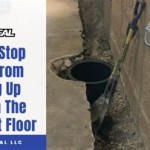Charcoal for Smelly Basement: An Effective Odor Control Solution
Basements, often situated partially or entirely underground, are naturally prone to moisture accumulation and poor ventilation. This combination creates an ideal environment for mold and mildew growth, which are frequent culprits behind unpleasant basement odors. While professional remediation and structural repairs are sometimes necessary to address the root cause of persistent smells, activated charcoal presents a simple and accessible method for mitigating or eliminating existing odors. This article will explore the efficacy of charcoal, particularly activated charcoal, in absorbing and neutralizing smells in basements, detailing its mechanism of action, different application methods, its limitations, and when professional intervention becomes necessary.
The effectiveness of charcoal in odor control stems from its highly porous structure. This structure provides an enormous surface area for adsorption, a process where gas molecules or liquid particles adhere to the surface of a solid. In the context of a smelly basement, the odor-causing molecules, released by mold, mildew, decaying organic matter, or other sources, are attracted to and trapped within the charcoal's pores. This process effectively removes these molecules from the air, diminishing or eliminating the offensive smell. While regular charcoal can provide some level of odor absorption, activated charcoal undergoes a further treatment process that significantly increases its porosity and, consequently, its odor-absorbing capacity.
Understanding Activated Charcoal: Properties and Advantages
Activated charcoal, also known as activated carbon, is typically produced by heating ordinary charcoal in the presence of a gas or chemical activator. This process creates millions of microscopic pores throughout the charcoal, dramatically increasing its surface area. A single gram of activated charcoal can have a surface area exceeding 500 square meters, making it an incredibly efficient adsorbent. This vast surface area allows it to capture a wide range of odor-causing compounds, including volatile organic compounds (VOCs), which are often released by mold and mildew.
The primary advantage of using activated charcoal for odor control is its natural and non-toxic nature. Unlike many commercial air fresheners that mask odors with synthetic fragrances and potentially release harmful chemicals into the air, activated charcoal simply adsorbs the offending molecules without introducing any secondary pollutants. This makes it a safer and more environmentally friendly option for use in living spaces, particularly in areas where children or pets are present.
Furthermore, activated charcoal is relatively inexpensive and readily available. It can be purchased in various forms, including granules, pellets, and powder, from hardware stores, garden centers, and online retailers. This accessibility makes it a practical and cost-effective solution for homeowners seeking to improve air quality in their basements.
Methods for Using Charcoal in Basement Odor Control
There are several ways to deploy activated charcoal for odor control in a basement. The chosen method often depends on the size of the basement, the severity of the odor problem, and personal preference.
One common approach involves placing containers filled with activated charcoal granules or pellets throughout the basement. These containers can be open bowls, perforated bags, or commercially available charcoal air purifiers. For larger basements or areas with particularly strong odors, multiple containers may be necessary. The placement of these containers is also crucial. Prioritize areas where the odor is most intense or where moisture is prevalent, such as near floor drains, sump pumps, or areas with visible mold growth.
Another method involves using activated charcoal filters in air purifiers. These filters are designed to remove airborne particles and odors, making them a more comprehensive solution for improving air quality. When selecting an air purifier with a charcoal filter, it's important to consider the unit's coverage area and the filter's replacement schedule. Regularly replacing the filter ensures optimal performance and prevents the charcoal from becoming saturated and losing its effectiveness.
For localized odor problems, such as a musty smell emanating from a specific corner or storage area, activated charcoal can be placed directly into the affected area. This can be done by sprinkling charcoal granules onto a surface or placing a charcoal filter inside a container. However, it's essential to ensure that the charcoal doesn't come into direct contact with sensitive materials or surfaces that could be stained.
A less common but still viable option involves using charcoal cloth or mats. These materials consist of activated charcoal embedded within a fabric or fiber matrix. They can be hung on walls, placed under carpets, or used to line shelves. Charcoal cloth is particularly useful for covering large surfaces or for areas where loose charcoal granules would be impractical.
Limitations of Charcoal and When to Seek Professional Help
While activated charcoal can be effective in mitigating basement odors, it's important to acknowledge its limitations. Charcoal primarily adsorbs odors; it does not eliminate the underlying source of the odor. If the root cause of the smell is not addressed, the odor will likely return once the charcoal becomes saturated. For example, if mold growth is the source of the odor, simply placing charcoal in the basement will not eliminate the mold. Mold remediation is necessary to permanently remove the source of the smell.
Furthermore, charcoal's adsorptive capacity is finite. Over time, the pores within the charcoal become filled with adsorbed molecules, reducing its ability to capture new odors. The lifespan of activated charcoal depends on the concentration of odors in the environment and the amount of charcoal used. In general, activated charcoal should be replaced every few months, or more frequently in areas with strong odors. Some activated charcoal products can be reactivated by exposing them to sunlight or high heat, but the effectiveness of this reactivation process can vary.
When dealing with significant water damage, extensive mold growth, or persistent and unexplained odors, professional intervention is often necessary. Mold remediation specialists can identify and eliminate mold colonies, repair water leaks, and implement measures to prevent future moisture problems. Similarly, professional odor control services can employ specialized equipment and techniques to neutralize stubborn odors, even those that are deeply embedded in building materials.
Specifically, the presence of black mold (Stachybotrys chartarum) warrants immediate professional attention. Black mold is a type of fungus that produces mycotoxins, which can be harmful to human health. Exposure to black mold can cause respiratory problems, allergic reactions, and other health issues. If black mold is suspected, it's crucial to avoid disturbing the area and contact a qualified mold remediation company for proper assessment and removal.
Moreover, if the basement odor is accompanied by other symptoms, such as visible water damage, structural problems, or health issues, it's important to consult with a qualified professional. These symptoms may indicate underlying issues that require more than just odor control measures. A home inspector or structural engineer can assess the basement's condition and recommend appropriate repairs or remediation measures.
In summary, charcoal represents a valuable tool for managing unpleasant smells in basements. It's a safe, natural, and cost-effective solution for absorbing and neutralizing a variety of odors. However, its effectiveness is limited by its adsorptive capacity and its inability to address the underlying source of the odor. When dealing with significant moisture problems, extensive mold growth, or persistent and unexplained odors, it's crucial to seek professional help to ensure a safe and healthy basement environment.

Charcoal Briquettes As A Deodoriser For Smelly Home Vietnam

Charcoal Briquettes As A Deodoriser For Smelly Home Vietnam

Charcoal Odor Absorber For Strong Large 4 Pack 200g Each Bamboo Air Purifying Bag Activated Closet Shoe Car Basement Musty Eliminator Deodorizer Walmart Com

Charcoal Briquettes As A Deodoriser For Smelly Home Vietnam

Odoban 7 Oz Charcoal Odor Eliminator Air Purifying Natural Non Toxic Remover Moisture Absorber Bag For Car Home 9760a61 200m The

Breathe Green Bamboo Charcoal Odor Eliminator Bag 3 Pack Activated Absorber Natural Freshener Removes Odors And Moisture For Home Pets Car Closet Basement Rv Walmart Com

Charcoal Briquettes As A Deodoriser For Smelly Home Vietnam

200g Pack Active Bamboo Charcoal Bag Air Purification Freshener Odor Eliminator For Home Pets Car Closet Basement Rv Walmart Com

Whdz 10 Pcs Bamboo Charcoal Air Purifying Bags With 5 Hanging Hooks Activated Odor Absorber For Shoe Basement Pet Room Wardrobe Car Smell Walmart Com

Air Purifying Bags Activated Bamboo Charcoal For Home Odor Absorb
Related Posts







